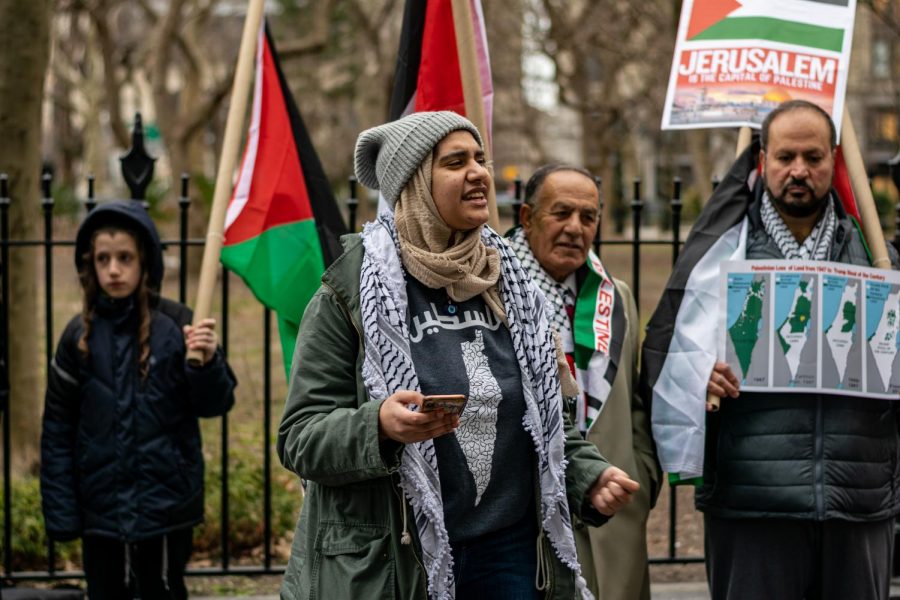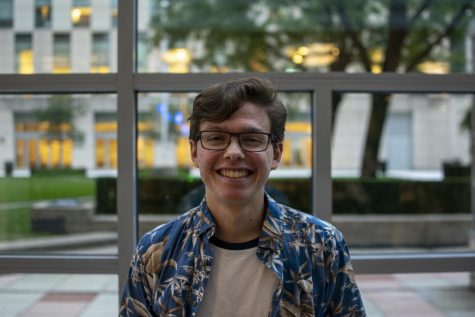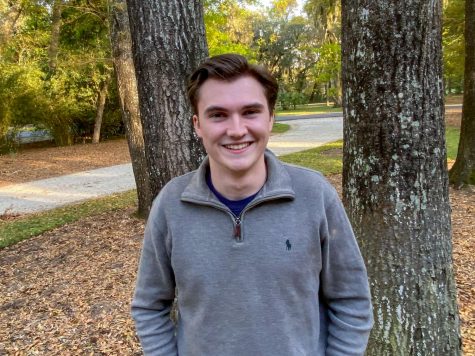120 Faculty Sign Petition to Support Students for Justice in Palestine
Batool Abdelhafez, FCLC ’21 and former president of SJP, speaks outside of City Hall at a rally for Palestinian rights. The group is once again fighting Fordham in court to maintain its recognition as an official club.
February 5, 2020
A diverse coalition of 120 Fordham faculty members have expressed their disapproval of Fordham’s continued legal battle with Students for Justice in Palestine (SJP).
On Thursday, Jan. 30, a faculty member emailed a petition to high ranking Fordham administration, urging them to rescind the university’s appeal of the August 2019 New York Supreme Court ruling that required the university to recognize Fordham Lincoln Center’s chapter of SJP.
The petition has two requests: first, that “the university drop its appeal of the New York Supreme Court decision;” second, that “The FCLC Office of Student Life should continue to treat Students for Justice in Palestine as the recognized student club” in accordance with the August 2019 New York Supreme Court decision and the November 2016 approval of the Lincoln Center United Student Government executive board and senate.
Catch up on SJP’s legal fight for club status here
Among the 120 signatories of the petition are faculty from six undergraduate and graduate schools and 26 academic departments across Fordham’s Lincoln Center, Rose Hill and Westchester campuses.
“There is a large group of faculty that are dismayed by the situation,” said Glenn Hendler, professor of English and American studies, and former faculty adviser to SJP.
Faculty from Fordham College at Lincoln Center, Fordham College at Rose Hill, Fordham Law school, and the graduate schools of both Social Service and Education are represented among the 120 names.
Aseel Sawalha, associate professor of anthropology, co-director of Women, Gender and Sexuality studies, and current faculty adviser to SJP, is the second signatory on the list and sent the email containing the petition to administrators. “We teach critical thinking, open-mindedness and then the university does not tolerate a student organization advocating for social justice,” she said. “It’s almost a joke.”
For many signatories, principle came before explicit support for the cause. “The faculty who signed the petition did not sign it because they are for SJP; they signed it because they disagree with the silencing of students on campus,” Sawalha said.
The petition is addressed to university president Rev. Joseph M. McShane, S.J., and copied to, among others, Interim General Counsel Margaret Ball, Esq.
Assistant Vice President for Communications Bob Howe spoke on behalf of the university: “Fordham acknowledges the issues raised in the petition, which the University has addressed in its procedures and in court filings. The University will await the outcome of its appeal before deciding upon any course of action.
“We view the University’s appeal of the NY Supreme Court decision as problematic for several reasons,” the petition reads.
Quoting Arturo Sosa, Superior General of the Society of Jesus, in his 2018 address to the International Association of Jesuit Universities, the petition portrays the appeal as contradictory to Fordham’s Jesuit mission. The university “is a privileged space for exercising human freedom … to search and find the paths of social transformation,” Sosa said.
“The students of SJP fully believe they are on one such path of social transformation,” the petition read. “The university should support their search for their path, not block it.”
A representative of SJP spoke to both the petition itself and Fordham’s official response. The petition “is significant because it shows what Fordham has done is a clear misdeed and neither the faculty nor the students are standing for it,” they said.
“Fordham’s response is both significant and insignificant,” the representative said. “It is insignificant because it does not address any of the issues raised in the petition. It is significant because of the Fordham administration’s overt censorship of what SJP stands for, and because SJP is the first club on campus to be explicitly anti-colonialist, anti-racist and anti-imperialist, where does that leave Fordham?”
Dean of Students Keith Eldredge, Senior Vice President for Student Affairs Jeffery Gray and Faculty Senate President Eve Keller were also recipients indicated on the document.
“The Faculty Senate Executive Committee realizes that the debate surrounding Fordham’s chapter of Students for Justice in Palestine involves many difficult questions, as does the University’s decision to appeal last summer’s New York Supreme Court ruling,” Keller said, speaking for the Executive Committee of the Faculty Senate.
“As is true of the student body, the faculty at large, and the full Faculty Senate, members of the Executive Committee bring a range of different perspectives to these issues and are not of one mind about them.”
Copied to the email were Chief Diversity Officer Rafael Zapata, FCLC Dean Laura Auricchio and FCRH Dean Maura Mast. Auricchio and Mast did not add further comment to the university’s official statement, and Zapata did not respond to a request for comment.
The petition further criticizes the legal appeal for its “chilling effect — both on how Fordham students experience a university that takes its students to court for starting a club that addresses issues of social justice; and also on the credibility of our university as a place that supports free speech and intellectual exchange.”
“This is the big free speech issue of our time,” Hendler said. “Fordham had the chance to let that speech happen, or to take the other side.”
As of Feb. 4, Fordham administration has not responded directly to Sawalha’s email. “One of the things that really annoyed some of us on the (petition) committee was that we did not receive a response. They didn’t even acknowledge that we sent the email,” she said.
“Faculty lose faith in the upper administration’s judgment when they make decisions like this,” Hendler said.
A final criticism of frugality argues that “money that will be swallowed in legal fees could be spent on more fruitful academic purposes.”
The university’s appeal is still in litigation and the future at Fordham of “the promotion of justice, the exercise of free speech, and the fostering of critical intellectual exchange,” as outlined by the petition, is yet to be determined.
For the signatories of the petition, the appeal sends a clear message, but not a permanent one.
“It’s not a good message for free speech on campus. It will prevent students from doing something similar in the future,” Sawalha said. “We need to bridge the gap between the generations; between students and the administration.”
“I wish they will talk to the students instead of taking them to court.”
The transcript of the SJP petition reads as follows:
To: Fr. Joseph McShane, SJ, President of Fordham University
CC: Jeffrey Gray, Senior Vice President for Student Affairs, Fordham University
Keith Eldredge, Assistant Vice President and Dean of Students, FCLC
Eve Keller, President Faculty Senate
Faculty Senate Committee on Student Life
Margaret T. Ball, Interim General Counsel
Re: Petition asking that Fordham not appeal the New York Supreme Court ruling requiring that the university recognize Students for Justice in Palestine
We the undersigned faculty members at Fordham University are concerned about recent developments pertaining to Fordham University College at Lincoln Center students’ right to organize a club called Students for Justice in Palestine.
The Supreme Court of the State of New York ruled on August 5, 2019 that Fordham’s decision to overturn the FCLC student government’s recognition of Students for Justice in Palestine (SJP) was “arbitrary and capricious” and that the university’s decision had no “rational basis.” The court concluded that Fordham’s rules do not empower it to restrict recognition of a student club based on its potential for raising issues or taking political positions that might be controversial or unpopular with a segment of the university community.
Therefore, in August 2019 Judge Nancy Bannon ordered that “Fordham University is directed to recognize Students for Justice in Palestine at Fordham University as a university-sanctioned club.” While the students who initially sought to form SJP at Fordham in 2016 have graduated, current students have successfully organized themselves. Fordham should embrace SJP as an active student club, especially after this clear 2019 legal victory. Yet as both student newspapers have reported, Fordham University’s administration has filed an appeal of the New York State Supreme Court ruling.
In light of this recent turn of events, we the undersigned Fordham faculty members support the former and current students’ court-approved right to form this club as members of a University community oriented toward the promotion of justice, the exercise of free speech, and the fostering of critical intellectual exchange. Specifically, we request that:
(1) The university drop its appeal of the New York Supreme Court decision, and;
(2) The FCLC Office of Student Life should continue to treat Students for Justice in Palestine as the recognized student club that it is, in compliance with the court’s August 2019 decision and the November 2017 votes of the United Student Government Executive Board and the Senate.
We view the University’s appeal of the NY Supreme Court decision as problematic for several reasons.
First, it contradicts Fordham University’s Jesuit mission, which aspires to foster “the intellectual,
moral and religious development of its students and prepares them for leadership in a global society”–a society that is fraught with complicated political, social, and economic realities, and for which Jesuit universities hold a particular responsibility–and opportunity to–foster the conditions that facilitate intellectual and moral reflection on pressing issues of our time. As Fr. Arturo Sosa, Superior General of the Society of Jesus, observed in his 2018 address to the International Association of Jesuit Universities: “The university is a diverse environment in which the conditions for dialogue and in-depth understanding of historical, personal and intellectual processes are produced. It is a privileged space for exercising human freedom…to search and find the paths of social transformation.” The students of SJP fully believe they are on one such path of social transformation. The university should support their search for their path, not block it.
Second, as faculty we are concerned that the University’s effort to undermine the NY Supreme Court ruling by appeal will have a chilling effect–both on how Fordham students experience a university that takes its students to court for starting a club that addresses issues of social justice; and also on the credibility of our university as a place that supports free speech and intellectual exchange.
Finally, as faculty we are puzzled by the apparent waste of university resources: Court battles are costly and time-consuming, and the money that will be swallowed in legal fees could be spent on more fruitful educational purposes.
Respectfully,
-
-
- Glenn Hendler, Professor of English and American Studies
- Aseel Sawalha, Associate Professor of Anthropology, Co-Director of WGSS
- Kathryn Kueny, Professor of Theology
- Shapoor Vali, Associate professor of Economics
- Jordan Alexander Stein, Associate Professor of English
- Fawzia Mustafa, Professor of English, African Studies, Comparative Literatureand WGSS
-
-
-
- Laura Wernick, Associate Professor
-
-
-
- Christiana Zenner, Associate Professor of Theology, Science, and Ethics
- James Kim, Associate Professor of English and Comparative Literature
- Susan Berger, Professor
- Andrew H. Clark, Chair, Dept. of Modern Languages and Literatures
- Diane George, Adjunct
- Cristiana Sogno, Associate Professor of Classics
- Christopher GoGwilt, Professor of English and Comparative Literature
- Carey Kasten, Associate Professor of Spanish
- Ronald S. Méndez-Clark, Associate Chair, Modern Languages and Literature
- Kathryn Reklis, Dr./Associate Professor
- John Seitz, Associate Professor
- Cynthia Vich, Associate Professor
- John Andrew Foster, Associate Professor
- O. Hugo Benavides, Chair, Sociology/Anthropology Department
- Micki McGee, Associate Professor of Sociology & American Studies
- Ben Dunning, Professor
- Robert Davis, Associate Professor of Theology
- Jeannine Hill Fletcher, Professor of Theology
- Sarah Zimmerman, Professor of English
- Arnaldo Cruz-Malave, Professor, Modern Languages, LALSI and Comp Lit
- Robin Andersen, Professor of Communication and Media Studies
- Ayala Fader, Professor of Anthropology
- Tom Beaudoin, Professor of Religion
- Sandy Turner, Assoc Professor GSS
- Shonni Enelow, Associate Professor of English
- Mark R. Patterson, Professor of Law
- Jerome Lahaye, Associate Professor of Economics
- Martin Chase, Professor of English and Medieval Studies
- Amir Idris, Professor, Chair of Dept. of African and African American Studies
- Amanda Armstrong, Assistant Professor of History
- Elizabeth Stone , Prof of English
- John Craven, Associate Professor
- Annika Hinze, Associate Professor Urban Studies
- Diane Rodriguez, Professor
- Zephyr Teachout, Associate Law Professor
- Maryanne Kowaleski, Professor of History and Medieval Studies
- Alex Markle, Assistant Professor, Gabelli School of Business
- Ivelisse Cuevas-Molina, Assistant Professor of Political Science
- Hooman Estelami, Professor of Business
- Yuko Miki, Associate Professor of History and Associate Director of LALS
- Mark D Naison, Professor of African American Studies and history
- Karen Siedlecki, Associate Professor of Psychology
- Bradford Hinze , Professor Theology.
- Samir Haddad, Associate Professor of Philosophy
- John J. Drummond, Robert Southwell SJ Distinguished Professor of Philosophy & the Humanities
-
-
-
- Sarah P. Lockhart, Associate Professor of Political Science
- Leonard Cassuto, Professor of English and American Studies
- Su-Je Cho, Professor of Education
- Steven J. Franks, Professor
- Samantha Iyer, Assistant Professor
- Maria Farland, Assoc Prof of English
- Wolfgang P. Mueller, Professor of History
- Mary Bly, Chair of English
- John Davenport, Professor of Philosophy
- Lise Schreier, Professor of French
- Sarah Gambito, Associate Professor / Director of Creative Writing
- Ian Morrison, Professor of Mathematics
- Ann Higgins-D’Alessandro, Professor
- Robert J. Penella, Emeritus Professor of Classics
- Asato Ikeda, Assistant Professor
- Rosemary Wakeman, Professor of History
- Vassilios Fessatidis, Professor of Physics & Engineering Physics
- Jeffrey Flynn, Associate Professor of Philosophy
- Kathryn Moore Heleniak, Professor of Art History
- Falguni Sen, Professor
- Claire Gherini , Assistant Professor of History
- Mary Ann Forgey, Professor
- Carl Fischer, Associate Professor
- Shiloh Whitney, Associate Professor of Philosophy
- Michael Lee, Professor, Theology and
- Daisy Deomampo, Associate Professor
- Francesca Parmeggiani, Professor, Mod Langs & Lits and Comp Lit
- Nina Rowe, Associate Professor of Art History
- Zein Murib, Assistant Professor, Political Science
- Diane Detournay, Lecturer
- Heather Dubrow, John D. Boyd, SJ, Chair in Poetic Imagination
- Chad McArver, Chair, Department of Theatre Visual Arts
- Daniel A. Jones, Associate Professor, Dept. of Theatre and Visual Art
- Mark Street, Program Director, Visual Arts
- Elisabeth Frost, Professor of English and Women’s/Gender/Sexuality Studies
- Patricia Belen, Artist-In-Residence, Visual Arts
- Elizabeth Margid, Head of Directing
- Matthew Maguire, Professor of Theatre
- Silvana Patriarca, Professor
- Jeanne Flavin, Professor of Sociology
- Asif Siddiqi, Professor of History
- Joseph Lawton, Clinical Associate Professor
- Matthew Gelbart, Associate Professor
- Johanna Francis, Associate Professor, Economics
- Barbara Hilkert Andolsen, Professor Emerita of Theology
- Garrett Broad, Assistant Professor, Communication and Media Studies
- Kirsten Swinth, Professor of History
- Irma Watkins-Owens, Associate Professor Emerita
- Thierry Rigogne, Associate Professor of History
- Kathleen LaPenta, Senior Lecturer
- Maria Ebner, Senior Lecturer , Modern Languages and Literatures
- Michael Latour , Lecturer,
- Alessia Valfredini, Senior Lecturer
- Kate Wilson , Adjunct, English & Soc-Anth
- Jacqueline Reich, Professor
- Jonathan Larson, Adjunct, Modern Languages and Literatures
- Sara Lehman, Professor of Spanish
- Christina Greer, Associate Professor
- Guillermo Severiche, Lecturer, Modern Languages and Literatures
- Vicente Rubio-Pueyo, Adjunct Instructor-Modern Languages Department
- Lunia Vera, Adjunct
- Jane Bolgatz, Associate Professor, Graduate School of Education
- Marciana Popescu, Associate professor,
- Patricia Romero , Spanish Lecturer
- Akane Zusho, Professor and Chair of Division of Psychological and Educational Services, GSE
-
-
-
- Hagit Halperin, Adjunct professor of Modern Hebrew
- Nicole Fermon, Professor
- Mariko Aratani, Japanese adjunct professor
- Hagit Halperin, Adjunct professor of Modern Hebrew
-













Jerry Leibowitz • Feb 11, 2020 at 11:03 am
Well said Richard Cravatts. SJP is full of anti-Semitic moments and remarks and nearly nobody seems to research it before signing their name! I read another article on this website written by a Jewish Fordham student and it dives into almost everything about the nature of SJP and why it oftentimes ends up pretty anti-Semitic. It is revealing and kind of a fascinating read. Your characterization is pretty accurate and I hope more people research it and realize.
https://fordhamobserver.com/41113/opinions/someone-who-tries-a-jewish-fordham-students-perspective-on-sjp/
Richard Cravatts • Feb 6, 2020 at 9:59 am
The signatories of this petition repeatedly allude to Students for Justice in Palestine’s campaign for so-called social justice, as if that ambition alone is sufficient to warrant the presence of this toxic group on the Fordham campus. In fact, little of what SJP does, both in the Fordham chapter and also on some 200 other campuses around the country, has little to do with helping the so-called Palestinians achieve social justice; in fact, their mission is more appropriately characterized as being singularly anti-Israel, and the bulk of their activism involves an unrelenting campaign to demonize Israel, libel the Jewish state with false accounts of history and fact, and to generate hatred and harassment towards Jewish students and others on campus who choose to support Israel for their own reasons. The Fordham administration was wise to object to the establishment of an SJP chapter because they were well aware of SJPs toxic history and corrosive tactics which do nothing for the Palestinians and do great damage to campuses where they operate, shutting down the speech of those whose views they oppose and pushing criticism of Israel way beyond normal limits, to the point where it is often morphs into raw anti-Semitism. If the KKK or a white supremacist student group were trying to obtain social justice for their constituents, not one of these brave faculty members would stand up for that group, nor would they be concerned if the speech and expression of these racists and bigots were, as they put it, “chilled.” The tactics, language, and aims of SJP are no different.